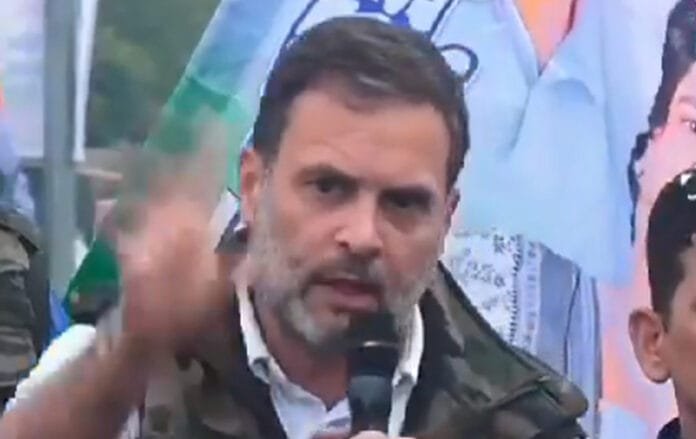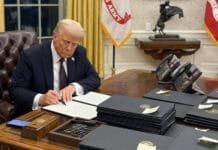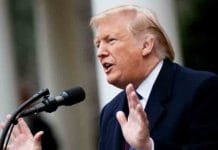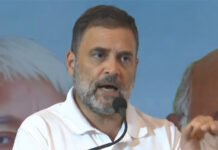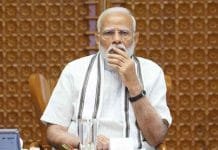US President Donald Trump has once again stirred controversy on the international stage with his recent comments targeting India’s economy, which he labeled a “dead economy” while threatening a 25% tariff. His remark, coupled with criticism of India-Russia bilateral trade, has ignited a sharp political backlash across India’s political spectrum. The issue has become even more heated as Congress MP Rahul Gandhi, leader of the opposition in the Lok Sabha, appeared to agree with the US President’s assessment—prompting disapproval not only from the ruling party but from members within his own party and other opposition leaders.
Trump’s Controversial Statement on India’s Economic Health
During a public address aimed at justifying his protectionist economic policies, President Trump remarked that India’s economy is “dead”, arguing that the United States should not worry about trade ties between India and Russia. He threatened a 25% import tariff on Indian goods and hinted at potential economic penalties for India’s ongoing defense and energy trade with Russia. This rhetoric appears to be part of a broader strategy aimed at squeezing both Russia and India economically.
Trump said, “India is trading with Russia freely. Their economy is not even working. It’s a dead economy. But they are buying weapons, oil, and tech from Russia, and we are paying the price. That ends now.”
These remarks have not only irked Indian policymakers but have also triggered an unprecedented political debate domestically.
Rahul Gandhi Echoes Trump’s Sentiments—Faces Internal Party Dissent
Rahul Gandhi, speaking to the media at the Parliament complex, stated, “If someone says India’s economy is dead, no one should be surprised by that. This reflects the complete failure of the current government’s economic, foreign, and defense policy.”
While Gandhi’s intention may have been to direct blame at Prime Minister Narendra Modi’s administration, his endorsement of Trump’s harsh assessment has backfired. Several senior Congress MPs privately expressed dismay, arguing that Gandhi’s comments inadvertently support a foreign leader’s derogatory narrative about India.
An anonymous senior Congress leader stated, “Criticizing the government is fine, but aligning with the US President’s demeaning remarks crosses a line. Our internal discourse should not validate foreign hostility.”
Opposition Parties Reject Both Trump and Rahul Gandhi’s Stances
Across party lines, leaders were quick to condemn both Donald Trump’s remarks and Rahul Gandhi’s endorsement of them. They emphasized that while domestic economic challenges exist, labeling India’s economy as “dead” is not only inaccurate but insulting to a nation of 1.4 billion people with a rapidly growing tech, manufacturing, and services sector.
TMC’s Derek O’Brien: “India Is Not a Pawn”
Trinamool Congress leader Derek O’Brien strongly reacted, saying, “India is not a pawn on the global chessboard. Trump’s remarks are colonial in tone, and we condemn them outright. And we expect our leaders not to cheer for such language.”
Samajwadi Party’s Akhilesh Yadav: “Let’s Fix It, Not Finish It”
Akhilesh Yadav, chief of the Samajwadi Party, criticized the current state of economic policy but rejected the idea that India is economically dead. He stated, “There are issues, yes. But India is resilient. It’s our job to fix the system, not to support foreign insults.”
DMK’s Kanimozhi: “Trump’s Tariff Politics Won’t Work”
DMK leader Kanimozhi described the 25% tariff threat as a “diplomatic provocation” rather than a genuine economic concern. “This is trade bullying, pure and simple. India must not bow down to such pressures, and neither should Indian politicians nod in agreement.”
Indian Economy: Slowdown, But Far from Dead
Although India has faced recent economic headwinds, including slowing GDP growth, inflationary pressures, and geopolitical uncertainties, multiple indicators highlight that the country remains far from the brink of collapse.
GDP Growth: India’s GDP grew at 6.8% in Q2 2025, outpacing most developed nations.
Manufacturing Expansion: The PMI index showed consistent growth in the industrial sector.
Startup Ecosystem: India continues to be the third-largest startup hub globally.
Forex Reserves: India’s foreign exchange reserves remain robust at over $630 billion.
Trump’s “dead economy” remark is thus economically unfounded, and largely seen as a tactic to pressure India over its neutral stance on Russia.
Government Responds Cautiously but Firmly
India’s Ministry of External Affairs issued a measured but firm response, dismissing President Trump’s comments as “unwarranted and factually incorrect.”
A spokesperson said, “India’s economic fundamentals remain strong, and our bilateral engagements are based on mutual respect. We reject any external comment that undermines our economic integrity.”
Meanwhile, Commerce Minister Piyush Goyal stated that India was willing to discuss tariffs but would not accept unilateral impositions or trade blackmail.
US Tariff Decision Postponed: A Temporary Relief or Tactical Pause?
Amid the backlash, President Trump has reportedly postponed his 25% tariff decision on Indian imports by one week, citing “ongoing discussions with Indian diplomats.” However, analysts see this as a temporary pause, possibly aimed at gaining leverage.
While some see the delay as an opportunity for backchannel negotiations, others view it as part of Trump’s habitual “deal-maker pressure tactics.”
Geopolitical Context: India-Russia Ties Under Scrutiny
Trump’s ire appears partly rooted in India’s continued cooperation with Russia, particularly in the fields of energy, defense, and space technology. Despite Western sanctions, India has maintained its strategic autonomy, purchasing discounted Russian oil and military equipment.
India is the largest buyer of Russian crude outside China.
The Indian defense sector relies heavily on Russian-origin platforms.
India-Russia ties date back to Cold War solidarity and have recently been reaffirmed through joint military drills and bilateral pacts.
This independent foreign policy stance may not align with Washington’s current expectations, but it remains a cornerstone of India’s global posture.
Conclusion: National Interest Above Political Posturing
As President Trump escalates rhetoric to serve domestic and geopolitical agendas, Indian politicians face a critical responsibility: to defend national integrity without falling into the trap of external validation.
Rahul Gandhi’s remarks, though possibly intended to highlight internal misgovernance, risk undermining India’s international image by echoing foreign accusations. Meanwhile, the unified response from other Indian political voices offers reassurance that, despite ideological divides, there is consensus on one front: India’s economy is not dead, and foreign insults will not be entertained.
In a time of global uncertainty, India’s ability to navigate diplomatic hostility, economic challenges, and internal political divisions will define its trajectory. And no foreign power, not even an ally like the United States, can dictate that path.

